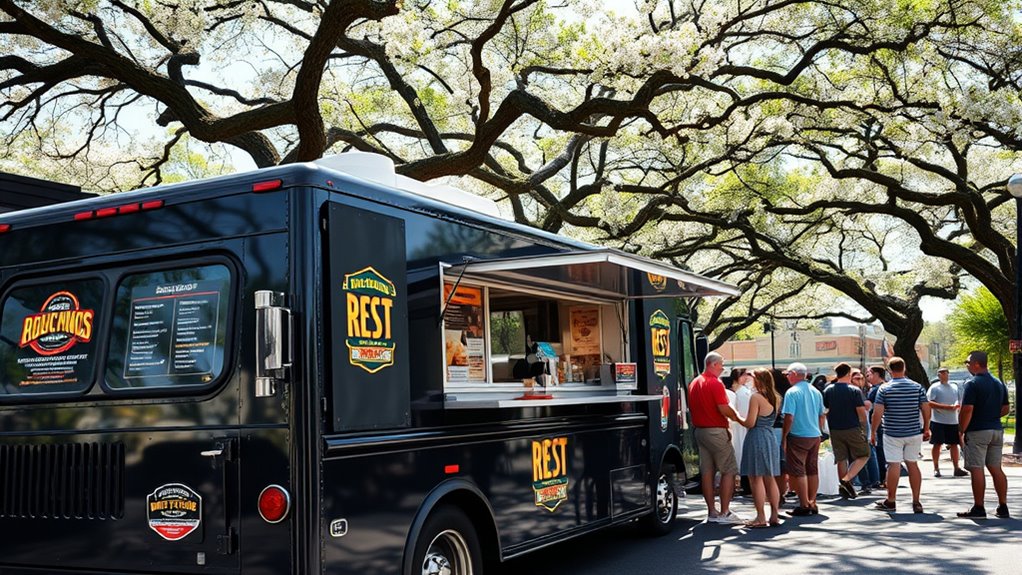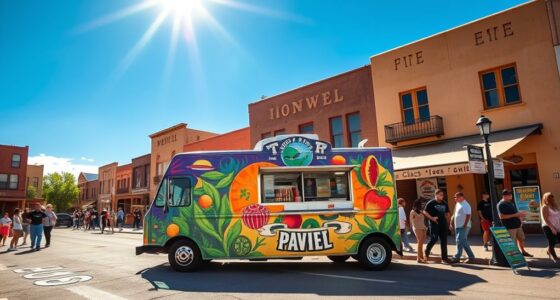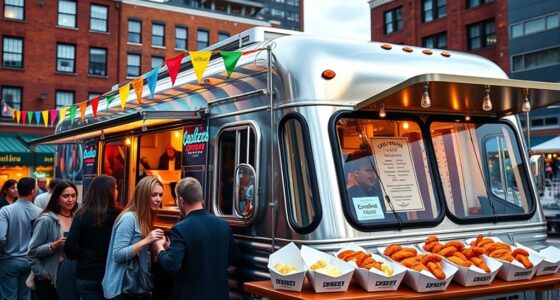To start your food truck in Baton Rouge, you’ll need permits like a Mobile Food Truck Vendor Permit (~$450), an occupational license, and health and safety certificates. Expect initial costs between $40,000 and $150,000 for trucks, plus monthly expenses for food, fuel, and wages. Choose busy locations with proper permits, develop a Louisiana-inspired menu, and use social media and local apps for marketing. Keep compliance in mind to pass inspections and succeed—more details await if you continue exploring this guide.
Key Takeaways
- Obtain necessary permits including Mobile Food Truck Vendor Permit (~$450), Occupational License, and health and safety compliance through local and state agencies.
- Budget $40,000–$150,000 for truck purchase or lease, plus approximately $28,000 annually for permits, licenses, and regulatory fees.
- Operate within designated vending zones, adhere to local operating hours, parking rules, and avoid restrictions near schools or residential areas.
- Develop a Louisiana-inspired menu featuring Cajun, Creole, seafood, and regional flavors, with options appealing to diverse customer preferences.
- Use social media, food apps, and targeted marketing to attract customers, build reputation, and increase sales by leveraging Louisiana flavors and prime locations.
Navigating Permits and Licenses for Your Food Truck
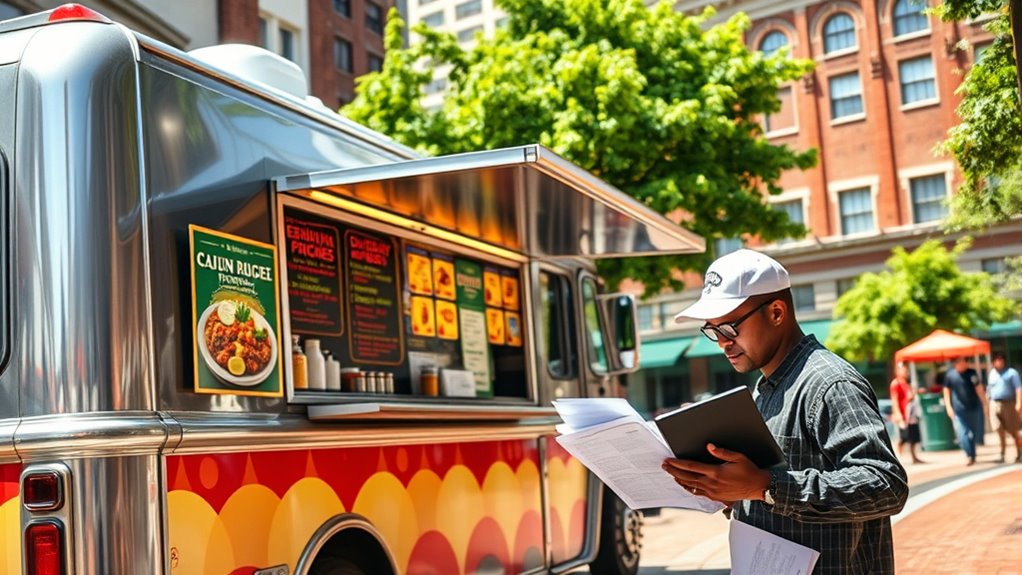
Getting your food truck up and running in Baton Rouge requires maneuvering a series of permits and licenses. First, you’ll need a City-Issued Mobile Food Truck Vendor Permit, which costs around $450 total. You also need an Occupational License for operating in East Baton Rouge Parish, with a fee of about $150 to $200 annually. Obtain a Sales Tax Certificate from the Louisiana Department of Revenue to sell taxable items, and verify you file monthly tax returns. You must register your business with the Louisiana Secretary of State and get an IRS EIN before applying for permits. Additionally, a Mobile Vendor Permit covering health, fire, and safety compliance is essential. City-Issued Food Truck Permits ensure your food truck operates legally and meets local requirements, keeping you on the right side of city and state regulations. Incorporating sustainable practices can also enhance your brand’s reputation and appeal to environmentally conscious customers.
Understanding the Initial and Ongoing Costs of Operating
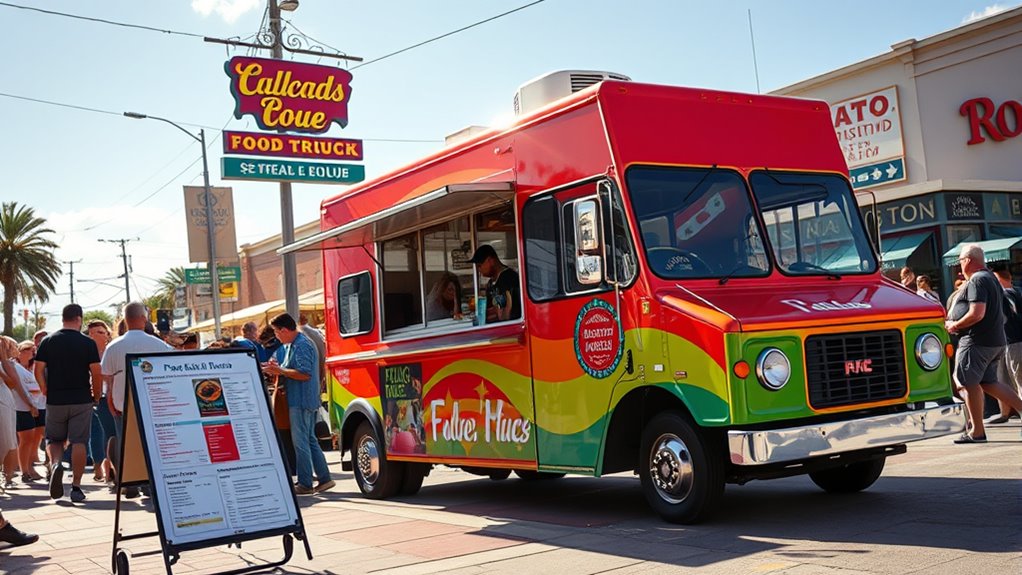
Understanding the costs involved in launching and maintaining a food truck business in Baton Rouge is essential for planning a realistic budget. The initial vehicle costs vary widely: new trucks can cost $75,000 to $150,000, used trucks $40,000 to $80,000, and rentals around $2,000 to $3,000 monthly. You’ll also need to budget for kitchen equipment, technology like POS systems, and vehicle customization. Permits, licenses, and compliance fees typically total about $28,000 in the first year. Operating expenses include monthly food costs of $1,000 to $3,000, fuel expenses around $500 to $1,000, and wages for staff. Don’t forget ongoing costs for marketing, insurance, maintenance, and unexpected repairs, which can add considerably to your budget over time. Additionally, it’s important to account for regulatory costs, including health permits, parking fees, and inspections, which can vary based on local requirements. Being aware of the initial investment needed can help you better prepare for the financial commitment involved in starting a food truck.
Selecting Prime Locations and Adhering to Operating Restrictions
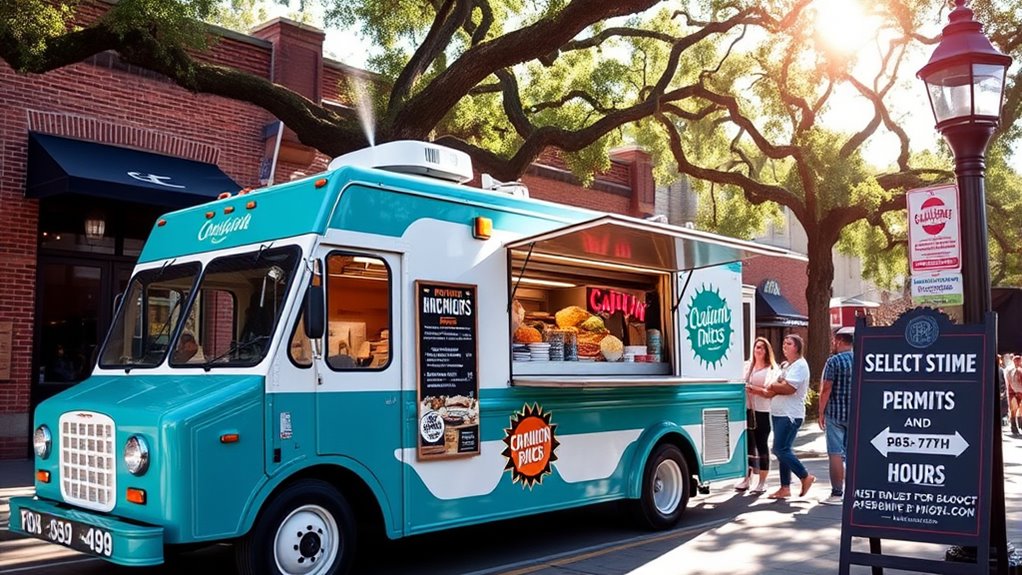
Choosing the right location is key to your food truck’s success, but you need to follow designated vending zones and parking rules. Keep in mind that operating hours and time limits can vary depending on the area, so it’s essential to *maintain* within these restrictions. By understanding and adhering to local regulations, you’ll avoid fines and ensure your business runs smoothly. Utilizing effective location scouting techniques can help identify optimal spots that comply with local rules.
Designated Vending Zones
To operate legally and safely, food trucks must stay within city-designated vending zones approved by Baton Rouge or East Baton Rouge Parish. These zones are carefully marked to guarantee public safety, excluding areas near intersections, stop signs, wheelchair ramps, and bike ramps. Certain streets, like Main Street and Plank Road in nearby Baker, are off-limits due to zoning restrictions. You can’t place permanent fixtures, furniture, or signs outside your truck within these zones, keeping walkways clear. Maintain a clean area, keeping a 50-foot radius free of trash during and after operation. You must also follow zoning rules, avoid operating near similar businesses, and restrict vending during certain hours or in school zones. Compliance ensures you meet safety, noise, and advertising regulations while serving your customers. Additionally, understanding zoning restrictions helps ensure your food truck operates smoothly within legal boundaries.
Parking and Time Limits
Proper parking placement and adherence to time limits guarantee your food truck operates smoothly and within the law. You can park in designated zones, but must move every 4 hours to prevent congestion. Ensure your truck stays at least 20 feet from intersections, stop signs, or traffic signals for safety. Avoid parking within 3 feet of driveways, ramps, or pedestrian pathways to maintain accessibility. Always follow city parking laws and pay meter fees when required. Rotate locations to access prime spots while reducing neighborhood impact. Use the table below to keep track of key restrictions:
| Zone Type | Distance/Time Limit | Restrictions |
|---|---|---|
| Parking Duration | Max 4 hours in one spot | Move to prevent congestion |
| Proximity to Intersections | 20 feet minimum | Ensure traffic safety |
| Pedestrian Access | Keep 3 feet clear of ramps and walkways | Maintain accessibility |
| Similar Business | Maintain buffer zones | Reduce competition |
| Noise & Utilities | Use quiet generators | Minimize disturbances |
Additionally, proper signage can help inform customers and compliance officers of your operating hours and restrictions.
Operating Hours Restrictions
Operating hours play an essential role in selecting prime food truck locations and ensuring compliance with local regulations. In Baton Rouge, you generally cannot operate between midnight and 6 a.m., especially in residential areas, to minimize disturbances. Near schools, there are often time-specific restrictions, usually prohibited during school hours for safety reasons. Commercial zones may allow longer or more flexible hours, but you must follow city permit rules. Noise restrictions limit generator and sound system use during early mornings and late nights. Your permits specify allowed hours, and abiding by these is critical to avoid fines or permit revocation. High-traffic areas like downtown or LSU are best during peak lunch hours. Seasonal permits may enable extended hours, but always coordinate with city regulations. Additionally, local noise ordinances often restrict loud operations beyond certain hours, which can impact your menu offerings and operational planning. Ensuring compliance with operating hours restrictions helps maintain good relationships with local residents and authorities.
Crafting a Safe and Appealing Menu for Baton Rouge Customers
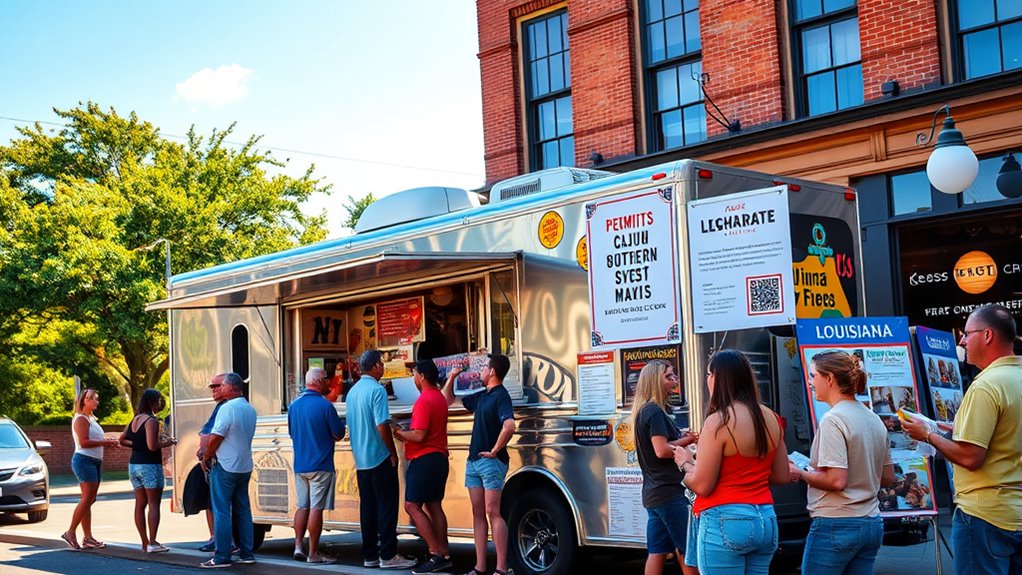
Creating a menu that is both safe and appealing for Baton Rouge customers requires a strategic focus on local flavors and dietary preferences. Emphasize Cajun and Creole seasonings like cayenne, garlic, and paprika, and use seafood staples such as shrimp, crawfish, and oysters. Incorporate classic Louisiana preparations like jambalaya and roux-based sauces, and highlight marinated, slow-cooked meats seasoned with regional spices. To appeal to diverse tastes, offer proteins like chicken, pork, beef, and vegetarian options seasoned with Cajun spices. Additionally, include global influences like Latin or Asian flavors to attract a wider audience. Keep safety top of mind with proper seafood storage, hygiene protocols, and temperature control, ensuring a delicious, safe experience for all.
| Flavor Focus | Dietary Options |
|---|---|
| Cajun & Creole | Vegetarian dishes |
| Seafood | Non-alcoholic beverages |
| Louisiana spice | Global flavor influences |
| Marinated meats | Small-plate options |
| Regional trends | Value meal combinations |
Effective Marketing Strategies to Grow Your Food Truck Business
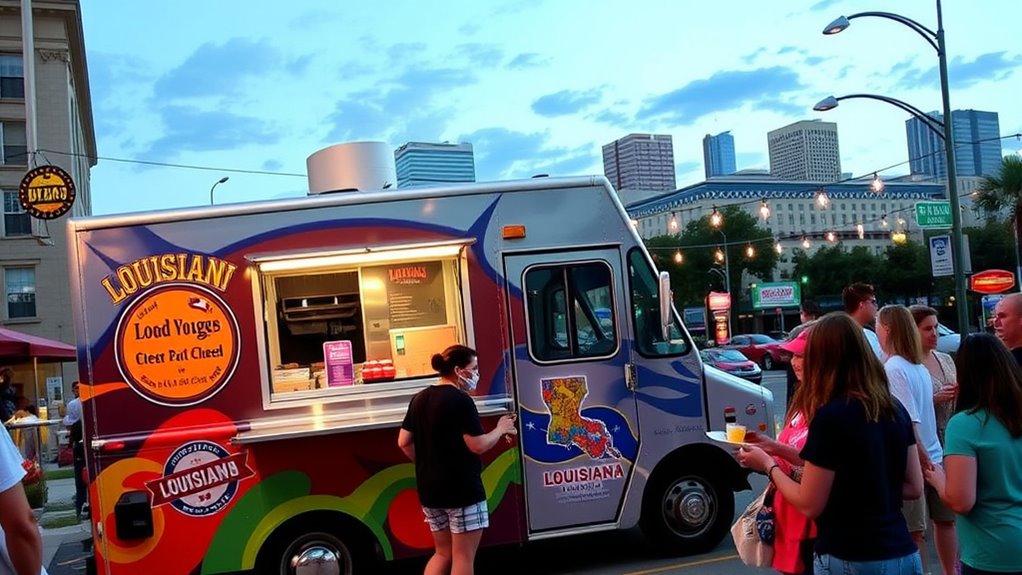
To effectively grow your food truck business, leveraging social media platforms is essential, as they offer direct access to your target audience and boost visibility. Facebook is the top choice, with 75% of food trucks actively marketing there to reach a broad audience. About 68% of owners regularly use social networks for customer engagement and brand building, and social media campaigns can increase sales by around 20%. Active social media presence also correlates with customers spending roughly 15% more. Additionally, platforms focused on food truck tracking and ordering have seen a 35% increase in downloads, enhancing visibility and customer convenience. Social media marketing efforts consistently posting updates, promotions, and engaging content helps attract new customers, foster loyalty, and drive revenue growth for your Baton Rouge food truck. Building a strong online reputation through positive reviews and customer feedback can further enhance credibility and attract more patrons.
Ensuring Regulatory Compliance and Passing Inspections
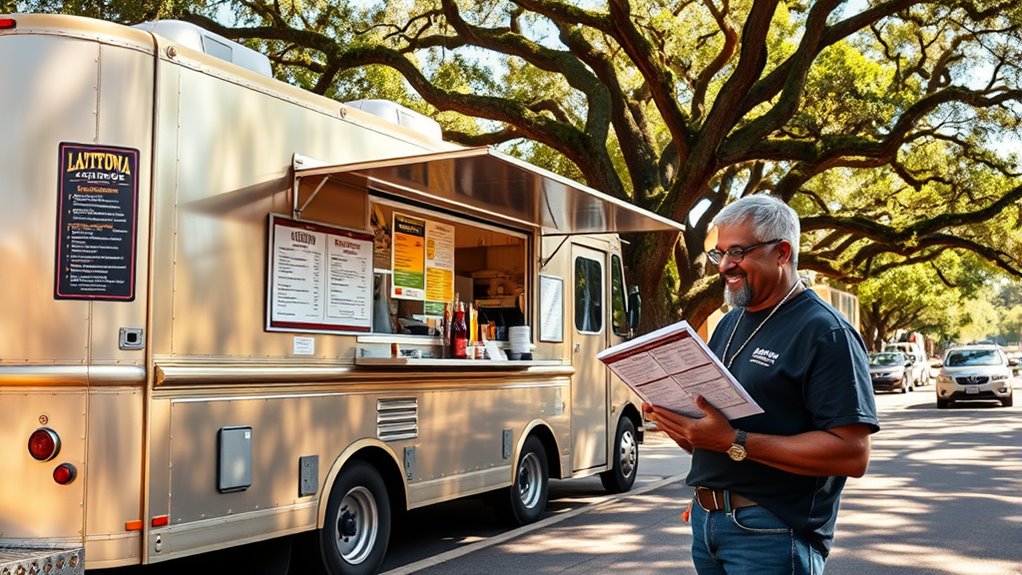
Growing your food truck business in Baton Rouge means more than attracting customers; it also requires strict adherence to local regulations and passing health inspections. You’ll need permits from the Louisiana Department of Health, including food safety certifications for your staff and detailed records of cleaning, temperatures, and sourcing. Operating requires access to an approved commercial kitchen, not just the truck. Equipment must meet NSF standards and be well-maintained, with proper waste disposal documented. Register your vehicle, obtain liability insurance, and secure necessary licenses, like the City-Parish Occupational License. The health department conducts scheduled and surprise inspections, so keeping thorough documentation and maintaining sanitary conditions are essential. Adhere to location rules, operational limits, and safety standards to pass inspections and stay compliant. Using Eye Patch techniques can help improve your overall appearance, which might be beneficial when interacting with customers or during inspections.
Frequently Asked Questions
How Long Does the Permit Approval Process Typically Take in Baton Rouge?
You’re probably wondering how long the permit approval process takes in Baton Rouge. Typically, it ranges from 2 to 4 weeks, depending on the permit type and application completeness. Food truck permits may take longer due to health and vehicle inspections. Applying well in advance and submitting all required documents helps speed things up. Keep in mind, busy seasons and multiple department reviews can extend the timeline.
Are There Specific Vehicle Size or Design Restrictions for Food Trucks?
Imagine your food truck as a sleek ship steering Baton Rouge’s busy waters. You must guarantee it’s double-axle, fully mobile, and fits within size limits to avoid crashing into restrictions. The design must be clean, safe, and compliant with health standards, avoiding outside furniture or advertising. Keep it clear of intersections, driveways, and stay within designated zones. Your vessel needs proper registration, insurance, and permits to sail smoothly through city regulations.
Can I Operate My Food Truck Year-Round in Baton Rouge?
Yes, you can operate your food truck year-round in Baton Rouge. You’ll need a Mobile Food Truck Vendor Permit and must adhere to health, fire, and zoning regulations. Keep in mind parking restrictions, location limitations, and noise ordinances, especially in residential areas. Weather won’t legally prohibit your operation, but you should plan for seasonal changes and maintain your vehicle and permits consistently to stay compliant and ensure smooth year-round business.
What Are Common Reasons for Permit or Health Inspection Delays?
You might face permit or health inspection delays if your application is incomplete or incorrect, missing signatures, or submitted late. Inspections can be delayed due to high volumes, failed initial checks, or non-compliance with health codes. External factors like utility coordination or conflicting requirements from city agencies can also slow the process. Additionally, equipment issues, staffing shortages, or administrative backlogs contribute to these delays.
Are There Any Specific Local Taxes or Fees Unique to Baton Rouge Food Trucks?
You might think taxes are just a minor annoyance, but in Baton Rouge, they’re a financial battlefield! The city imposes a total of 10.5% sales tax on prepared foods, plus an extra 2% for municipal purposes. This means every sale you make could be taxed more heavily than you realize. You must register, collect, and remit these taxes diligently, or face hefty penalties and interest that can quickly drain your profits—so stay vigilant!
Conclusion
Starting a food truck in Baton Rouge can be a rewarding venture, especially with the city’s vibrant food scene. Did you know that food trucks generate over $2 billion annually nationwide? By understanding permits, costs, locations, and marketing, you set yourself up for success. Keep compliance in check, craft a tasty menu, and engage your community. With the right approach, you’ll turn your passion into a thriving business in the heart of Louisiana.
